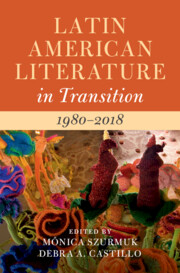Book contents
- Latin American Literature in Transition 1980–2018
- Latin American Literature in Transition
- Latin American Literature in Transition 1980–2018
- Copyright page
- Contents
- Contributors
- Acknowledgments
- Introduction
- Part I Security
- Part II New Genres
- Part III Mobilities
- Part IV Positionalities
- Chapter 17 Linguistic and Literary Tensions in Contemporary Paraguay
- Chapter 18 The Remaking of the “New Man” in Queer Cuban Cinema
- Chapter 19 Dissident Sexualities in Southern Cone Literature
- Chapter 20 Queer Feminist Hip Hop
- Chapter 21 Figures of the Impersonal in Contemporary Latin American Culture
- Part V Latin American Literature in Global Markets
- Index
- References
Chapter 20 - Queer Feminist Hip Hop
from Part IV - Positionalities
Published online by Cambridge University Press: 24 November 2022
- Latin American Literature in Transition 1980–2018
- Latin American Literature in Transition
- Latin American Literature in Transition 1980–2018
- Copyright page
- Contents
- Contributors
- Acknowledgments
- Introduction
- Part I Security
- Part II New Genres
- Part III Mobilities
- Part IV Positionalities
- Chapter 17 Linguistic and Literary Tensions in Contemporary Paraguay
- Chapter 18 The Remaking of the “New Man” in Queer Cuban Cinema
- Chapter 19 Dissident Sexualities in Southern Cone Literature
- Chapter 20 Queer Feminist Hip Hop
- Chapter 21 Figures of the Impersonal in Contemporary Latin American Culture
- Part V Latin American Literature in Global Markets
- Index
- References
Summary
According to Guatemalan MC Rebeca Lane, “Feminism for me and for us and many women in Latin America it’s not about a book, it’s not about theory, it’s not about academics. It’s about how you feel and how you want to live your life without machismo.” As a hip-hop artist, that means addressing what she sees as targeted attacks on vulnerable populations in Latin American: women, Indigenous, and queer. Through a message that is infused with feminism and social justice, as well as national, international, and personal histories, Lane fights for greater visibility for queer women in hip hop through her collective Somos Guerreras, which furthers female networks among a new and younger generation of women. Building on the hip hop of Krudas Cubensi, the Black queer feminist hip-hop group formed in Cuba in the 1990s, this chapter traces the emergence of queer hip-hop feminisms throughout Latin America. Doubly marginalized both by cultures and music genre that celebrate heteronormativity, machismo, and overtly sexualized female representations, artists like lesbian Mexican rapper Niña Dioz are changing not just what it means to be a female in hip hop but also a feminist in the Americas.
- Type
- Chapter
- Information
- Latin American Literature in Transition 1980–2018 , pp. 314 - 327Publisher: Cambridge University PressPrint publication year: 2022

